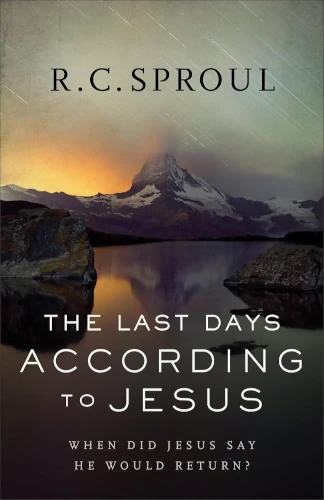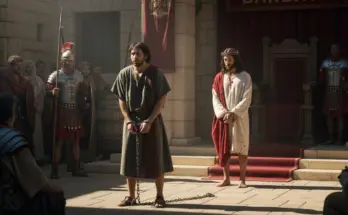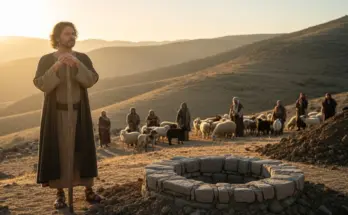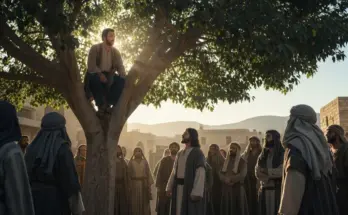When we think of Noah, we picture animals, an ark, and a massive flood. But his story goes much deeper than that. Noah lived in a time when the world was completely corrupt. Everyone did what was evil, except one man.
Noah stood out because he walked with God. That one choice changed everything. Because of his faith, God gave humanity a second chance. Even today, Noah’s story still speaks to us. We live in a world that often rejects truth. Like Noah, we’re called to stay faithful when no one else will. His story reminds us that obedience isn’t always popular, but it’s always worth it.
Ready to grow in God’s Word? Grab Tim LaHaye’s classic guide and start your journey today!
Through Noah, we also see God’s judgment. The flood came because sin filled the earth. Yet we also see God’s mercy. He provided a way of escape for those who listened. As we study Genesis 6 through 9, we’ll walk through Noah’s world—the warnings, the ark, and the rainbow.
Each part reveals more about God’s character and what He expects from us today. Noah’s faith wasn’t passive. He acted on God’s word, even when it didn’t make sense. That kind of faith still pleases God. So let’s look beyond the children’s story. Let’s explore what he teaches us about standing strong, obeying God, and trusting His plan.
Noah’s life wasn’t just marked by one big moment, it was shaped by consistent faith and obedience over time. As we look closer at his strengths and accomplishments, we’ll see why God chose him for such a vital mission. His example shows us what it means to live faithfully, even when the world around us falls apart.
Strengths and Accomplishments of Noah
Noah didn’t just live in a sinful world, he lived in one so corrupt that God decided to start over.
Yet, Noah stood out. While everyone else followed evil desires, Noah “walked faithfully with God.”
That one line tells us so much. He didn’t drift with the crowd. Instead, he stayed close to the Lord.
Because of this, God saw Noah as righteous and blameless in his generation. That doesn’t mean he was perfect. But it does mean Noah was consistent. He made daily choices to honor God, even when no one else did. Today, we face our own versions of corruption. Like Noah, we’re called to walk with God, even when it’s lonely.
Obedient to God’s Instructions (Genesis 6:14–22)
God gave Noah detailed instructions for building the ark. Every measurement, material, and design had a purpose. Noah didn’t argue or change the plan. Instead, he did everything just as God commanded. That kind of obedience takes trust. It also takes endurance. Building a huge boat without rain in sight must have seemed strange. Still, Noah didn’t stop. He stayed faithful, step by step.
Preacher of Righteousness (2 Peter 2:5)
Genesis doesn’t say much about Noah’s words, but the New Testament fills in the picture.
Peter calls him a “preacher of righteousness.” So while Noah built the ark, he also spoke the truth. He warned people and urged them to turn back to God. Sadly, no one listened. But he stayed faithful to his message. This reminds us that success isn’t always about results. Sometimes, it’s about staying faithful to the message God gave us.
Saved His Family (1 Peter 3:20)
Because Noah obeyed, his whole household was saved. Only eight people survived the flood, and all of them were related to Noah. He couldn’t change the world, but he covered his home in obedience. That’s a powerful reminder for us. Our faith affects those closest to us.
Recipient of God’s Covenant (Genesis 9:8–17)
After the flood, God made a covenant with Noah. It was the first named covenant in the Bible. God promised never to destroy the earth by water again. The rainbow became the sign of that promise.

The Last Days according to Jesus: When Did Jesus Say He Would Return?
In the hype of sensational books and movies, one important question is often obscured: What did Jesus believe and teach about the end times and the timing of his return? In his characteristically precise and compelling style, renowned theologian R.C. Sproul points us to the words of Christ Get Yours on Amazon
Weaknesses and Mistakes of Noah
Even faithful people like Noah had moments of weakness. After the flood, he planted a vineyard and drank some of its wine. Genesis 9:20–21 tells us he became drunk and lay uncovered in his tent.
This may have been Noah’s first experience with wine. Maybe he didn’t realize how it would affect him. Still, it was a lapse in judgment. His actions had consequences beyond himself.
One of his sons, Ham, dishonored him. As a result, Noah pronounced a curse, not on Ham, but on Ham’s son, Canaan. We might wonder why that happened, but Scripture doesn’t give us all the details.
What we do see is this: even Noah, a man of faith, stumbled.
Even after experiencing God’s power and mercy, he let his guard down. This reminds us that no one is beyond temptation, not even someone as faithful as Noah. His story warns us to stay alert, especially after spiritual victories. Sometimes, the greatest tests come after the storm has passed.
When life calms down, we can forget how much we still need God’s guidance.
Yet, Noah’s mistake doesn’t erase his legacy. God still remembered his faith and honored the covenant. We shouldn’t focus only on his failure. Instead, we learn from it. It’s comforting to know that God works through imperfect people. Even when we stumble, He offers grace, and a way to move forward.
Lessons from The Life of Noah
Faith isn’t just something we feel, it’s something we live out. Noah didn’t just believe in God. He acted on God’s word. God told him to build an ark before rain had ever fallen. That command must have seemed strange. Still, Noah obeyed. He cut wood, followed measurements, and built a massive boat on dry ground. His faith wasn’t passive. It worked through obedience.
Sometimes, God asks us to do things we don’t fully understand. Like Noah, we’re called to trust and obey anyway.
You Can Stand for God, Even When No One Else Does
Noah didn’t have a support group or a faith-filled community. Scripture gives no record of other believers in his generation. Even so, Noah remained faithful. He didn’t follow the crowd, he followed God. That’s not easy to do. But his example reminds us we’re never truly alone when we walk with God. Even in dark times, we can still choose righteousness.
God Remembers Those Who Obey Him (Genesis 8:1)
Genesis 8:1 gives us a powerful moment: “But God remembered Noah…” This doesn’t mean God forgot him. It means God took action on Noah’s behalf. After months inside the ark, Noah saw proof that obedience is never wasted. God always keeps His promises. He sees our efforts. He knows our hearts. And He remembers.
Obedience Brings Salvation—for Us and Others
Because Noah obeyed, his family was saved. Eight people survived the flood because one man listened to God. Our obedience often affects more than just ourselves. When we follow God, we create space for others to find safety and hope. Sometimes, our faith covers our home the way the ark covered Noah’s family.
Covenant Is Tied to Obedience
After the flood, God made a covenant with Noah. The rainbow was the sign, but it came after Noah followed through. Obedience opened the door to a new relationship with God. In the same way, when we walk in obedience, God meets us with promises. Covenant always follows commitment.
God Is Both Judge and Savior
The flood was a judgment on sin. But the ark was a sign of mercy. God dealt with evil, yet He also provided a way of escape. Noah’s story reminds us that God takes sin seriously. At the same time, He offers rescue to those who trust Him. He is both just and loving. That balance shows up all through Scripture, and it starts here. Noah’s life is more than a Sunday school story. His obedience, boldness, and faith still speak to us today. The question is: are we willing to trust God, even when the world doesn’t?
Vital Statistics for Noah
Sometimes it helps to pause and look at the basic facts. These details give us a fuller picture of who Noah was. Noah’s name means “rest” or “comfort.” That’s fitting, considering his life brought comfort in a time of great judgment. Even before the flood, his father Lamech believed Noah would bring relief from the cursed ground (Genesis 5:29).
Noah was a man of many skills. He farmed the land, built the ark, and preached righteousness (2 Peter 2:5). Even though farming was common, building a massive boat was not. Still, he obeyed God and completed the task. He lived before the flood, most likely in the Mesopotamian region. While the Bible doesn’t name the exact spot, it does place the ark’s landing on the mountains of Ararat (Genesis 8:4).
Noah came from the godly line of Seth. His father was Lamech, and he had three sons: Shem, Ham, and Japheth. Though his wife isn’t named, she and their sons’ wives all joined Noah on the ark (Genesis 7:13). Through them, God repopulated the earth.
Noah was 600 years old when the flood came (Genesis 7:6). He lived another 350 years afterward.
Altogether, Noah lived 950 years (Genesis 9:29). Even with such a long life, what stands out most is Noah’s faith. His story still encourages us thousands of years later.
- Name: Noah (means “rest” or “comfort”)
- Occupation: Farmer, boatbuilder, preacher
- Location: Lived before the flood, possibly near Mesopotamia
- Family: Father—Lamech; Sons—Shem, Ham, Japheth; Wife—unnamed
- Age at flood: 600 years old (Genesis 7:6)
- Lifespan: 950 years (Genesis 9:29)
Key Verse for Noah
Noah was a righteous man, blameless among the people of his time, and he walked faithfully with God. (Genesis 6:9, NIV)
This verse sums up Noah’s character. He didn’t follow the world—he followed God. Even when surrounded by corruption, Noah stayed faithful. It reminds us that we, too, can live set apart.
Like Noah, we’re called to walk with God, even when it’s hard. His example still challenges us to be faithful in a faithless world.
Closing Thoughts on Noah
Noah lived during one of the darkest times in human history. Evil filled the earth, and violence was everywhere. Yet even then, Noah found favor with God (Genesis 6:8). That one verse gives us hope.
Noah didn’t blend in with his culture. Instead, he walked faithfully with God. And because of that, God chose to use him. His faith wasn’t just something he believed, it was something he lived out. Obedience wasn’t easy, but Noah did what God asked. He built an ark, gathered animals, and warned others. Because of that, he helped preserve human life and restart the world.
Even though Noah made mistakes, God still honored his faith. That encourages us. We don’t have to be perfect, we just need to stay faithful. Noah’s legacy speaks to us today. He reminds us that faith requires action, especially when it’s unpopular. He also shows us that one person’s obedience can make a difference.
When we feel outnumbered or overlooked, we can remember Noah. If he could walk with God in his day, then so can we in ours. So let’s be people who live by faith. Let’s obey God, even when it’s hard.
And let’s trust that our obedience, like Noah’s, matters more than we know.
Explore More Bible Character Studies
This study is part of our Bible Character studies, explore the lives, lessons, and faith of men and women throughout Scripture. For more outlines, studies, and resources, return to the Bible Study Toolbox homepage. Contact us with any questions.



